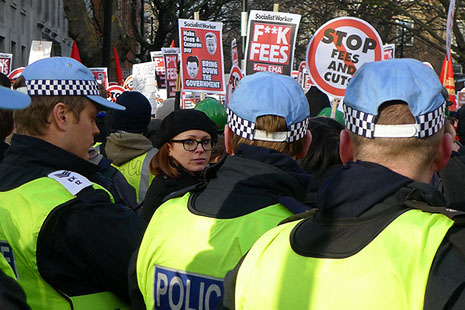HAS the revolution begun yet? Last Thursday’s helicopters, sirens, riot police and chanting protesters – followed by shattered glass, graffitied buildings and smashed heads – might have been a taster. But what kind of country allows the heir to the throne and his wife to get so close to the centre of rioting to attend a Royal Variety Show – in a Rolls Royce, no less? Perhaps meeting Australia’s very own Kylie Minogue was too tempting.
It was a stuff-up, I’m sure, but perhaps also implicit recognition that the bark of student protest is worse than its bite. With a fine sense of irrelevance, a few protesters did indeed attack their Royal Highnesses’ car, cracking the windows and splashing it with paint. Camilla even apparently received a poke in the ribs with a stick. But despite the chant of “Off with their heads,” no axe was in sight, and there is very little chance of this Charles facing the same fate as his seventeenth-century ancestor and namesake. On the other hand, a student needed emergency brain surgery after police allegedly clobbered him with a truncheon.
But perhaps you prefer your revolutions postmodern? If so, London’s also your kind of town, for last week we had Australia’s very own Julian Assange, arrested in response to an application by Sweden for his extradition over accusations of sex-related crimes against two women. The nomadic cyber-hero found himself in City of Westminster Magistrates’ Court and later Wandsworth Prison, where he remains at the time of writing. Among the celebrities who offered to put up bail money was Australia’s very own John Pilger, and our very own Geoffrey Robertson will be Assange’s barrister. With all these antipodean troublemakers about, it’s almost like a Christmas re-run of the London Oz trials, although Assange’s ambitions and impact make those of Richard Neville and his mates look pretty modest.
The results of Assange’s “revolution” are available on page one of the Guardian every day, as the details of each latest leaked US cable are revealed. And when companies such as Visa, MasterCard and PayPal refused to accept payments on behalf of WikiLeaks, hackers exacted their revenge in what they called Operation Payback by crashing their computer systems.
Set beside these protests on the streets and the net, the indoor activities in Westminster seem a bit dowdy, if rather more sensibly located during London’s freeze. There was never much doubt that the Coalition government’s legislation to increase the fees that universities can charge their students (possibly up to £9000 a year) would be passed by the Commons. Nevertheless, in a house of 650 members, twenty-one votes is a close shave for a government barely six months old. The Liberal Democrats split, with twenty-one of their members voting against the legislation and five abstaining. Eight Tories also either opposed the legislation or abstained.
A recent opinion poll showed Lib Dem support running at 8 per cent (compared to its 22 per cent support at the May election). Perhaps Lib Dem parliamentarians come from big families because I can’t for the life of me imagine who these 8 per cent might be. We can be reasonably certain after yesterday’s effort that whatever remains of the Lib Dems at the next election won’t be terribly popular among the younger set – or among academics, for what their votes are worth.
I popped into Waterstone’s in Bloomsbury back in May and bought a handsome little booklet called the Liberal Democrat Manifesto 2010. Pages 38 and 39 would have been particularly encouraging if you were sufficiently naive to believe any of it. Quite apart from a coloured picture of their moderately photogenic leader, Nick Clegg, apparently addressing some children in a library, I found a promise to “scrap unfair university tuition fees for all students taking their first degree.” We now know that even at the time this document was issued, key party figures no longer believed in this policy and were willing to ditch it to get their hands on the levers of power in a coalition. But, unwilling to bear the political costs involved, they refrained from letting voters in on that dirty little secret. So much for the new politics that their leader Nick Clegg announced as the Lib Dem mission.
Now, in government, the Lib Dems have done the opposite to what they said they would do; and not on a peripheral issue, but on one over which they were silly enough to stake their reputations. Similarly, they went to the election criticising Tory proposals for drastic and immediate spending cuts, while in government they’ve not only supported them but have, in some cases, been even more gung-ho than their Tory partners.
Compromise is one thing, especially in a coalition. But the behaviour of the Liberal Democrats – the gaping chasm between promise and performance on key manifesto commitments – raises serious questions about the continuing viability of the government. No one doubts the coalition’s survival was on trial over tuition fees on Thursday evening. And no one’s sure that, even with the narrow victory achieved, it will be enough to secure the future of this increasingly shaky outfit.
Of course, right-wing Lib Dems and Conservative moderates bank on electors’ having moved on by the time of the next election. If they haven’t forgotten, they’ll at least have forgiven, especially when they see the dazzling measures soon to be laid out – reforms such as raising the income tax threshold to £10,000. The Lib Dems tell anyone who’ll listen how this will help the poor. In reality, it will mainly help those earning well over £10,000 a year. Lib Dem coalitionists also talk of the marvellous concessions they’ve been able to extract from those tight-fisted Tories over tertiary fees. But the exemptions achieved for poorer students, in fact, only serve to concede the case that they will be deterred in the first place by the massive fee hike.
For every unpopular policy, the Lib Dems are seen to bear responsibility. Their most public face, Clegg, has become a figure of ridicule and even hatred – a man who berated the major parties for broken promises before the last election now brazenly abandoning one manifesto commitment after another in his new role as David Cameron’s right-hand-man-cum-fall-guy. Some Lib Dem and Tory centrists dare hope that the most difficult issues are now behind them, that the open divisions of the previous week are a mere passing phase in the life of a large and mainly happy family. This should be seen for what it is: a fantasy that ignores the instability not only of British politics but of the wider political, economic and security environment. The front page of Saturday’s Times, for instance, reported that in the wake of recent demonstrations the police are planning an “intrusive and robust” response that would include stop-and-search of suspected troublemakers and the use of water cannons. The Times itself points out that they could use plastic bullets, while hastening to add “this has not yet been considered.” How will the Lib Dems, 70 per cent of whose members regard themselves as of the “left,” respond to such proposals?
It’s hard to predict, because the perception is already powerful that Lib Dem government members believe in nothing that they’re not prepared to trade in return for continuing access to executive power. The Tories’ concession of a referendum on reform of the voting system is not a bad example. Simon Jenkins recently defended the Lib Dems against the accusation of repeated broken promises on the grounds that those who favour proportional representation must accept the need for post-election compromise. There are a few problems with this argument. The last election wasn’t held under PR but under the usual first-past-the-post system. PR isn’t on offer now, and nor is a referendum on PR. The Australian-style alternative vote, or AV, isn’t about to be introduced, and nor has the senior partner in the coalition agreed to provide any actual support for the replacement of first-past-the-post with AV. All the Lib Dems gained was the concession of a referendum on AV, which will be held in May. Tories are free to oppose it if they wish, and the signs are that most will do so.
The chances of voters giving this reform the thumbs-up are close to zero. Yes, the polls have returned some mixed results, but the critical point is that most voters do not understand AV, and there is no reason to believe that greater public awareness will increase support. On the other hand, the growing unpopularity of the Lib Dems and the coalition generally will work to reduce support. The referendum will especially be an opportunity for voters to register a protest against the Liberal Democrats. Meanwhile, Labour-leaning voters who might otherwise have followed their leader, Ed Miliband, in supporting AV might now decide they don’t want a system that could produce more Lib Dem MPs and therefore more supporters of Tory–Lib Dem government. In light of the current state of British politics, this attitude is not entirely unreasonable.
FOR LABOUR, the times seem to present opportunity and danger in nearly equal measure. But complaints about Ed Miliband’s performance have recently grown louder. Former Blair chief of staff, Jonathan Powell, claims that Miliband has been offering “therapy” more than “leadership.” Unkind but anonymous insiders have suggested that Labour was doing better in the polls when he was recently on paternity leave. The idea that he is warming the leadership seat until brother David’s return closer to the next election is doing the rounds. There’s little doubt that the backgrounding and briefing of the media that were so integral to the Blair–Brown melodrama are also playing a major part in undermining Ed Miliband.
In reality, his performance has been reasonable. It was never going to be easy for Labour in the immediate aftermath of defeat, even one much narrower than it might have been. Ed only just defeated his brother in the leadership ballot, and the conservative press ran a predictable campaign against him afterwards, making much of the role of union votes in his victory and banging on about “Red Ed” as if they sensed that they had another Michael Foot on their hands. The tabloids especially thought it worthy of front-page treatment that he isn’t married to the woman with whom he is in a stable domestic relationship with young children.
His own strategy has been to place some daylight between himself and New Labour. He talks about the party having “lost touch with the people” and professes to be concerned about both the growing gap between rich and poor and the “squeezed middle.” In the impoverished political culture of post-Thatcherite Britain, this is deemed to be repositioning Labour to the left. And when the BBC’s John Humphrys tried to get him to define his “squeezed middle” during a taxing interview last month, he floundered. But then who wouldn’t, if asked to define “the middle class” in a country where the term is applied to anyone whose income sits within a range of £20,000 to £220,000?
Most recent opinion polls place Labour ahead in the polls. At a time when the government is unpopular, the temptation will be to do nothing, and wait for an implosion. And there is also the lure of laying into the Lib Dems while ignoring the Tories – which might just help deliver majority government to the Conservative Party. With an election probably more than four years away, Miliband’s strategy can only be a long-term one, as there’s little point in burning powder for short-term opinion polls and local government victories that lead all the way to humiliating defeat when it counts. But in a media culture driven by the twenty-four-hour news cycle, unless Miliband achieves regular hits on a vulnerable government, his support will gradually ebb away. •




